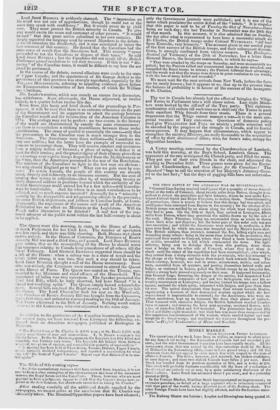Tke Globe of this evening says- " Aria() the contradictory
rumours that have arrived from America, it is not am I) form a clear conception of the circumstances and issue of the encounter
• mstsvten the Royal forces and the Canadians. Those, however, who are most iral=ned to form a judgment, appear to think that the Queen's troops were II- I-shed iu the first instance, but afterwards succeeded in taking St. Charles."
A itcr reading carefully. all the additional details supplied by the 3,ewsvapera, we cannot tame at the coaclusion that St. Charles was talituateltaken. The MontrealOpposition papers have been silenced ; only the Government journals were published; and it is one of the latter which proclaims the entire defeat of the "rebels." It is singular that this paper is said to be of Tuesday the 31st of November—there being no such day; the last Tuesday in November was the 28th day of that month. In this account, it is also admitted that on Sunday, the day after what is represented to have been a successful attack on pt. Charles, the British troops under Colonel WETHERALL "fell back Epos Rouvelle, very leisurely." The account given in our second page of the first success of the British troops, and their subsequent discom- fiture, is strongly confirmed from various sources. The Burlington Sentinel (of Vermont) of the 20th of November, has a letter from General BROWN, the insurgent commander, in which he says- " They were attacked by the troops on Saturday, and were momentarily re. pulsed ; but the Patriots rallied and concentrated upon the point attacked, and compelled the Royal troops to retreat ; the Patriots followed their advantage; and the result was that the troops were driven in great confusion to the woods, with the loss of many killed and wounded."
We must wait for the next arrivals from New York, before the facts can be surely known ; but it appears to us, that up to the present time the balance of probability is in favour of the success of the insurgents at St. Charles.


























 Previous page
Previous page